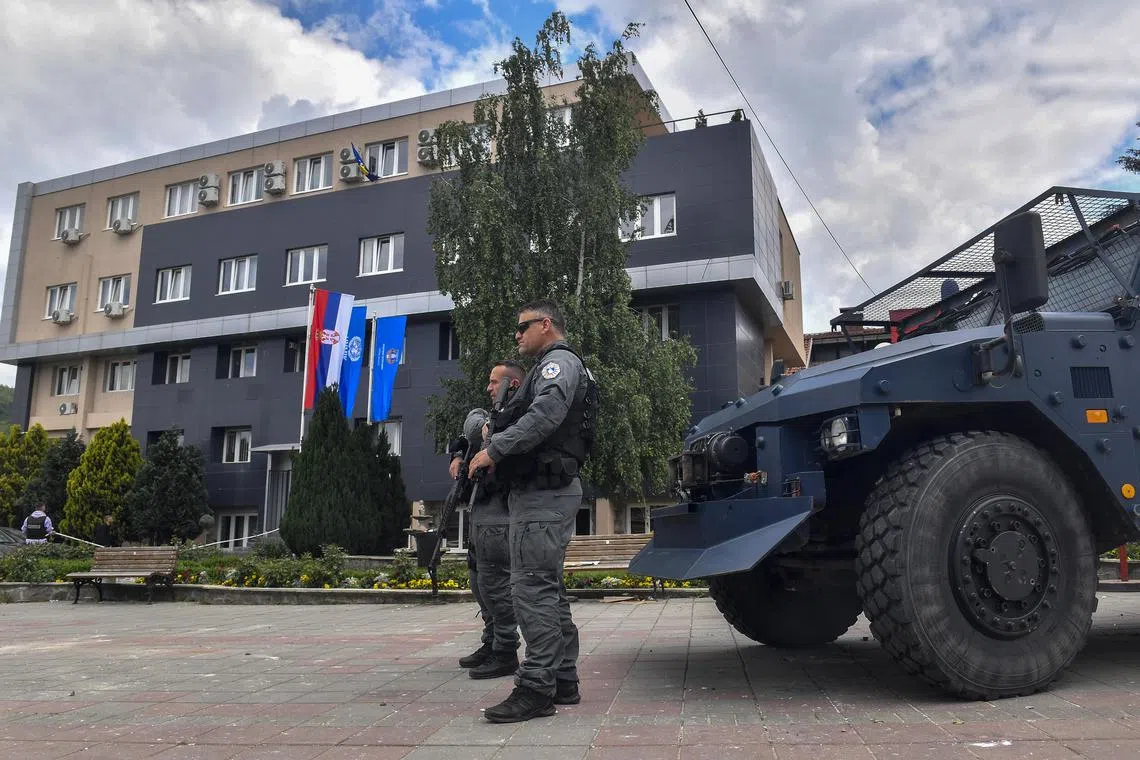US, allies condemn Kosovo after clash with Serb protesters
Sign up now: Get ST's newsletters delivered to your inbox

Kosovar police officers securing a building in the municipality of Leposavic, Kosovo, on May 27.
PHOTO: EPA-EFE
ZVECAN – The US and top European allies have condemned Kosovo’s government following clashes between police and ethnic Serbs that erupted when protesters tried to block ethnic Albanian mayors from reaching their offices in the north of the country.
Kosovo police used tear gas to disperse the crowds, which included demonstrators opposed to the officials taking office following local elections in April that the ethnic Serb community boycotted and called invalid.
It was the worst escalation in tensions in 2023 between Kosovo’s ethnic Albanian majority and the minority Serbs.
The flare-up imperils a European Union-brokered, US-supported plan for the Balkan neighbours to normalise relations, which have threatened to spiral again into violence since Kosovo broke away from Serbia after they fought a war from 1998 to 1999.
In an unusually sharply worded statement, US Secretary of State Antony Blinken denounced the authorities for accessing the buildings “by force” and said they had done so “against the advice of the United States and Kosovo’s European partners”.
“These actions have sharply and unnecessarily escalated tensions, undermining our efforts to help normalise relations between Kosovo and Serbia and will have consequences for our bilateral relations with Kosovo,” he said.
“We call on Kosovo Prime Minister Albin Kurti to reverse course and on all sides to refrain from any further actions that will inflame tensions and promote conflict.”
Serbian President Aleksandar Vucic reacted to the violence by immediately putting his nation’s army on high alert and ordered movement of an unspecified number of units closer to the border with Kosovo, state broadcaster RTS reported.
He took similar steps in 2022 when recurring tensions in Kosovo near the border nearly lapsed into fighting.
Britain, France, Germany and Italy also denounced Kosovo’s government, saying it had acted “despite our call for restraint”.
“We call on Kosovo’s authorities to immediately step back and de-escalate,” they said in a joint statement. They also expressed concern over “Serbia’s decision to raise the level of readiness of its Armed Forces at the border with Kosovo”.
They had earlier urged Kosovo to avoid deepening tensions via overt displays of authority, and the officials were sworn in during low-key ceremonies over the past week. But when they tried to enter their offices accompanied by police on Friday, hundreds of protesters barred their way in the municipalities of Zvecan, Leposaviq and Zubin Potok, police said.
After the crowds were told to disperse, some people hurled objects and gunfire was heard. Five officers were lightly wounded in the clashes, police said.
Serbian Defence Minister Milos Vucevic said the military is acting on the President’s orders because the situation in Kosovo has become “dramatic”.
Serbs account for less than 7 per cent of Kosovo’s mostly ethnic Albanian population of 1.8 million.
Kosovo Prime Minister Kurti’s spokesman denied reports that 10 protesters were injured and defended the government’s constitutional duty to enable the new mayors to access their offices and do their jobs.
He was backed by Kosovo President Vjosa Osmani, who accused the Serbian President of stoking the protests.
“The actions of the Kosovo Police against Vucic’s illegal structures and criminal gangs are legitimate, in fulfilment of their constitutional duties,” Ms Osmani said in a comment on Facebook.
She acknowledged, however, that the success of Kosovo’s actions relied on coordination with countries that guarantee Kosovo’s sovereignty, which include the US.
About 3,800 Nato peacekeepers remain deployed in Kosovo more than two decades after the war, ensuring that neither side reignites armed conflict. KFOR, as the force is known, was not involved in Friday’s events.
The government in Belgrade refuses to recognise Kosovo as a country, and rejects its 2008 split from Serbia – a sticking point that is blocking both countries’ efforts to join the EU.
Western envoys have sought to defuse the dispute for years, without success. They have intensified those efforts again after Russia attacked Ukraine. BLOOMBERG


